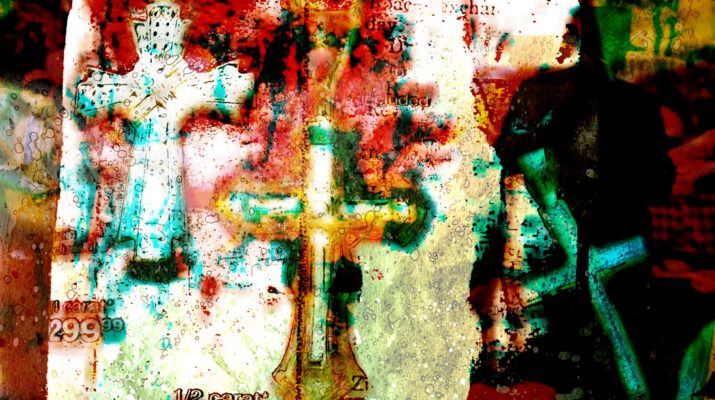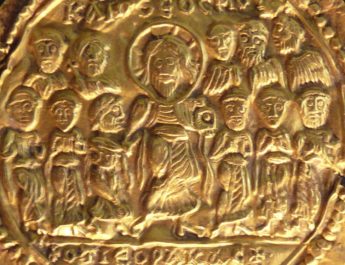Philippians 3:17-21
Tuesday of Holy Week – A Women’s Lectionary
17 ABrothersB and sisters, join in imitatingC me,
A {untranslated} = ginomai. This is to come into being, to happen, become, be born. It can be to emerge from one state or condition to another or is coming into being with the sense of movement or growth.
B “brothers” = adelphos. From a (with, community, fellowship) + delphus (womb). This is a brother in a literal or figurative sense. It is also used of another member of the Church.
C “join in imitating” = summimetes. 1x in NT. From sun (with, together with) + mimetes (a follower or imitator; imitation in a positive sense due to admiration of a good example); {from mimeomai (to emulate, follow, or imitate); from mimos (a mimic)}. This is a co-imitator, one who follows an example.
and observeD those who liveE according to the exampleF you haveG in us.
D “observe” = skopeo. 6x in NT. From skopos (a mark or goal like the marker at the end of a race; figuratively, other goals or destinations; also, a watch or sentry); from skeptomai (to peer out, consider, gaze carefully); perhaps related to skapto (to dig or excavate). This is to look at, take heed, consider, observe, or spy. This word shares a root with “scope” in English.
E “live” = peripateo. From peri (about, concerning, around, encompassing) + pateo (to read, trample on; to trample literally or figuratively); {from patos (trodden) OR from paio (to strike, smite, sting; a hit like a single blow)}. This is to walk. Going from Hebrew figurative language, to walk referred to how you conducted your life, how you chose to live. This word is most literally walking around. Figuratively, it is living, behaving, following, how you occupy yourself. This is where “peripatetic” comes from.
F “example” = tupos. 16x in NT. From tupto (to strike repeatedly, wound, punish; figuratively to offend). This is a figure, model, image, impression, pattern, copy. Properly, this is a model created through much repetition so figuratively it is the proper model. It can be the impression of a stamped image, the mark of a scar, the shape of a statue. Figuratively, it can refer to a style or resemblance. Used specially, it is a model as something to imitate or as a cautionary tale. This is where the word “type” comes from.
G “have” = echo. This is to have, hold, or posses.
18 For manyH live as enemiesI of the crossJ of Christ;K I have oftenL told you of them, and now I tell you even with tears.M
H “many” = polus. This is much, often, plenteous – a large number or a great extent.
I “enemies” = echthros. From echthos (hatred). This is an openly hostile person so an enemy, a foe, or a hated person. This speaks of irreconcilable hostility. It can also mean adversary and/or refer to Satan.
J “cross” = stauros. From the same as histemi (to stand, cause to stand). This is an upright stake, cross. Literally refers to the horizontal beam of a Roman cross, generally carried by the one convicted to die.
K “Christ” = Christos. From chrio (consecrate by anointing with oil; often done for prophets, priests, or kings). Literally, the anointed one, Christ. The Greek word for Messiah.
L “often” = pollakis. Related to “many” in v18. 18x in NT. From polus (see note H above). This is often, many, frequently, again and again.
M “tears” = klaio. This is to weep, lament, or sob. It is weeping aloud.
19 Their endN is destruction;O their godP is the belly;Q
N “end” = telos. From tel– (to reach a goal or aim); This is an end, aim, purpose, completion, goal, consummation, or tax. It is completing a stage of something and everything that results from that completion. It can be literal or figurative.
O “destruction” = apoleia. 18x in NT. From apollumi (to destroy, cut off, to perish – perhaps violently; to cancel or remove); {from apo (from, away from) + ollumi (to destroy or ruin; the loss that comes from a major ruination)}. This is destruction, loss, something cut off, ruin, perdition. It can be any kind of loss whether tangible, spiritual, or eternal.
P “god” = theos. From Proto-Indo-European origins, meaning do, put, place. This is God or a god in general.
Q “belly” = koilia. From koilos (hollow). This is belly or organs in the abdomen. So, it could be stomach, womb, or heart. Figuratively, this refers to one’s inner self.
and their gloryR is in their shame;S their minds are setT on earthlyU things.
R “glory” = doxa. From dokeo (to have an opinion, seem, appear, suppose; a personal judgment; to think); from dokos (opinion). This is literally something that evokes a good opinion – something that connects to our understanding of intrinsic worth. The ultimate expression of this is, of course, God and God’s manifestation. So, this is opinion, honor, and dignity, but also praise, glory, renown, and worship.
S “shame” = aischune. 6x in NT. From the same as aischuno (to dishonor, put to shame, shrink, disfigure); from aischos (shame, disgrace, disfigurement). This is shame, disgrace, dishonesty, a shameful thing. This can be used in an abstract or concrete sense.
T “minds are set” = phroneo. From phren (diaphragm, heart, intellect, understanding; figurative for personal opinion or inner mindset; thought regulating action; sympathy, feelings, cognition); perhaps from phrao (to rein in or curb). This is to think, judge, use one’s mind, have an opinion, shape one’s opinion through action. It refers to one’s insight or inner perspective expressing itself through behavior.
U “earthly” = epigeios. 7x in NT. From epi (on, upon, what is fitting) + ge (earth, land, soil, region, country, the inhabitants of an area). This is earthly or worldly. It can mark the earth in contrast to the sky or the earth in contrast to heaven. It can include all of physical life or describe the moral character of the world.
20 But our citizenshipV is in heaven,W and it isX from there
V “citizenship” = politeuma. Related to “many” and “often” in v18. 1x in NT. From politeuomai (literally to live like a citizen. Figuratively, it can be to conduct oneself as a citizen does.); from polites (citizen, townsperson); from polis (a city or its inhabitants; is a town of variable size, but one that has walls); probably from the same as polemos (war, quarrel, strife; battle, whether one time or on-going); {from pelomai (to bustle) or from polus (see note H above)}. This is citizenship, commonwealth, community, conversation.
W “heaven” = ouranos. May be related to oros (mountain, hill) with the notion of height. This is the air, the sky, the atmosphere, and heaven. It is the sky that is visible and the spiritual heaven where God dwells. Heaven implies happiness, power, and eternity.
X “is” = huparcho. From hupo (by, under, about, subordinate to) + archo (to rule, begin, have first rank or have political power). This is to begin or be ready, to exist or possess. It is what one already has or possesses.
that we are expectingY a Savior,Z the LordAA JesusBB Christ.
Y “expecting” = apekdechomai. 8x in NT. From apo (from, away from) + ekdechomai (to take or receive, expect, await; to welcome someone from your heart; focusing on the goal of waiting or the outcome); {from ek (from, from out of) + dechomai (to warmly receive, be ready for what is offered, take, accept, or welcome; to receive in a literal or figurative sense)}. This is eager awaiting or fully expecting something.
Z “Savior” = soter. From sozo (to save, heal, preserve, or rescue. Properly, this is taking someone from danger to safety. It can be delivering or protecting literally or figuratively); from sos (safe, rescued, well). This is savior, deliverer, preserver.
AA “Lord” = kurios. From kuros (authority, supremacy). This is a respectful address meaning master or sir. It refers to one who has control or power greater than one’s own. So, it was also applied to God and Jesus as Master or Lord.
BB “Jesus” = Iesous. From Hebrew Yehoshua (Joshua, the Lord is salvation); {from YHVH (proper name of the God of Israel; the self-existent and eternal one); {from havah (to become) or from hayah (to come to pass, become, be)} + yasha (to deliver, defend, help, preserve, rescue; properly, to be open, wide or free, which implies being safe. So, in a causative sense, this is to free someone)}. This is Jesus or Joshua in Greek – the Lord saves or the Lord is salvation.
21 He will transformCC the bodyDD of our humiliationEE that it may be conformedFF to the body of his glory,
CC “transform” = metaschematizo. Related to “have” in v17. 5x in NT. From meta (with, among, after, beyond) + schematizo (to give something a specific shape or form) OR from meta (see above) + schema (figure, appearance, form – outer shape; figuratively, can be external condition); {from echo (see note G above)}. This is to transfigure, transform, or otherwise change appearance or even outward manner.
DD “body” = soma. Related to “Savior” in v20. Perhaps from sozo (see note Z above). This is body or flesh. It can be body in a literal or figurative sense (as the body of Christ). This is where the word “somatic” comes from.
EE “humiliation” = tapeinosis. 4x in NT– in Luke 1:48 in the Magnificat “God has looked with favor on the lowliness of God’s servant.” From tapeinoo (bringing someone or something low; figuratively to humble or humiliate – to depress or abase); from tapeinos (low in position, depressed, low in circumstance; fig humiliated, low in spirit). This is humiliation, lowliness, low state, depression.
FF “conformed” = summorphos. 2x in NT. From sun (with, together with) + morphe (form, shape, external appearance; an appearance that embodies inner essence; figuratively, the nature of something); {perhaps from meros (a part or share, portion); {from meiromai (to get one’s allotment or portion)}. This is similar or conformed to. It is behavior that mirrors inner essence. It is jointly formed.
by the powerGG that also enablesHH him to make all thingsII subjectJJ to himself.
GG “power” = energeia. 8x in NT. From energes (active, effective, operative, energized, powerful); {from en (in, at, by, with, among) + ergon (word, task, action, employment); {from ergo (to work, accomplish) or from erdo (to do)}}. This is activity, working, efficiency, strong, or divine energy. It is also where the work “energy” comes from.
HH “enables” = dunamai. This is to be able, or something that is possible. It can also be empowered or being powerful. The Greek word for “miracle” (dunamis) comes from this root.
II “all things” = pas. This is all or every.
JJ “make…subject” = hupotasso. From hupo (by, under, about, under one’s authority) + tasso (to arrange, appoint, determine). This is to place under. So it is to subject, submit, obey, or subordinate.
Image credit: “Family” – collage by Humphrey King, photo by AK Rockefeller, 2014.




